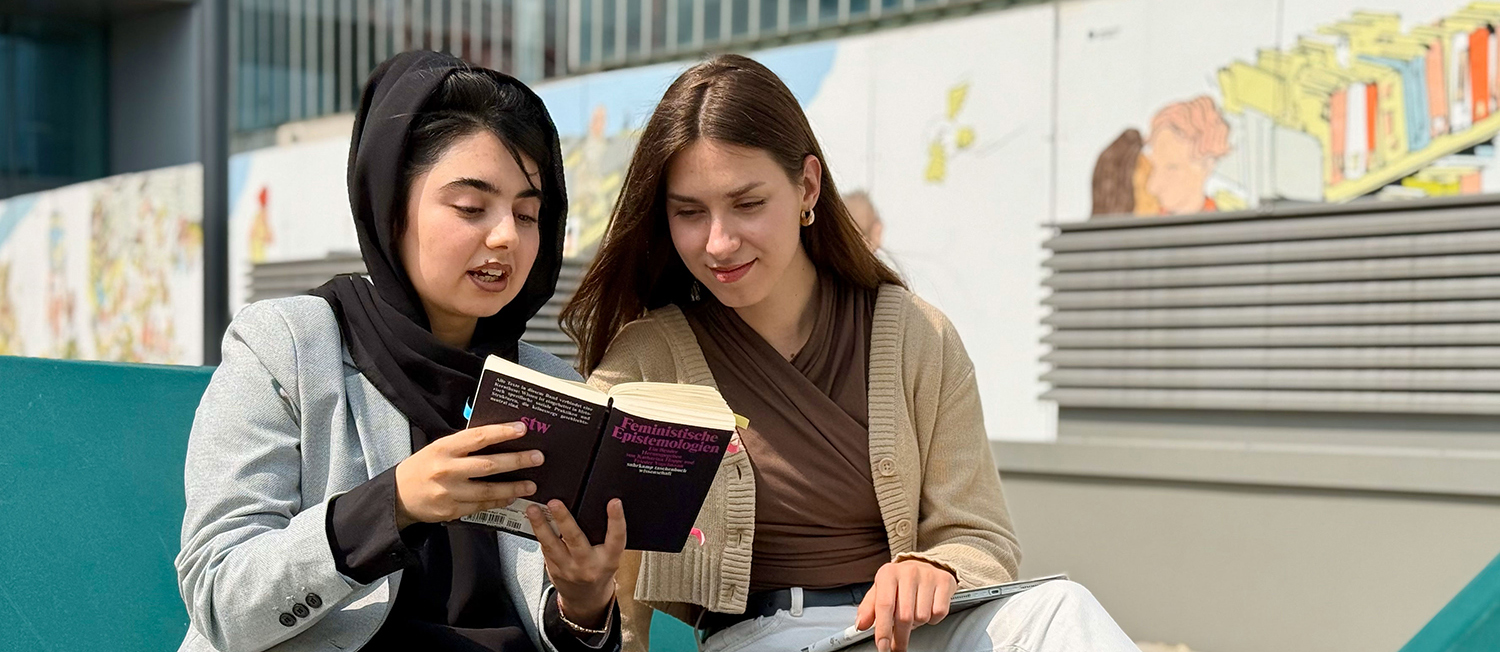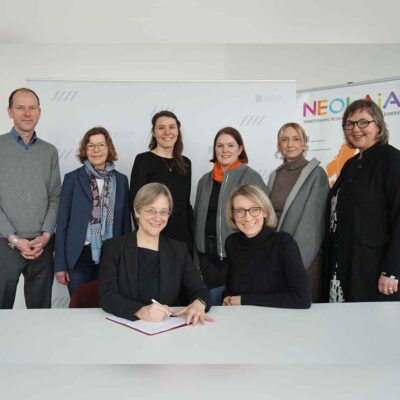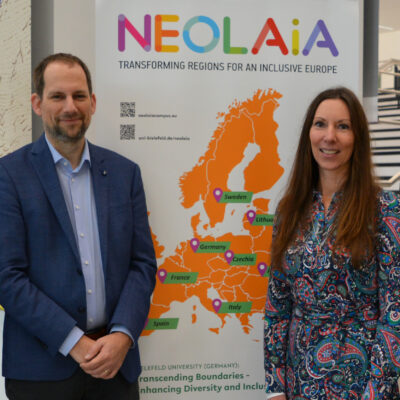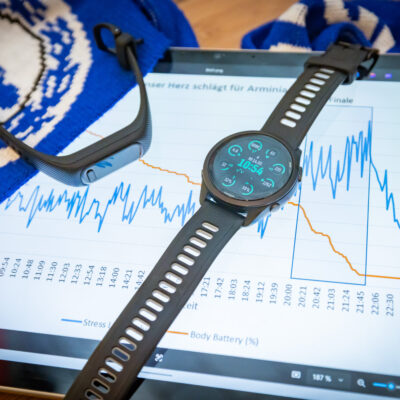The two international students Oleksandra Rudyk and Mehria Niazi had a common goal after their flight: to study in Germany. The preparatory German courses at Bielefeld University made this possible. Their experiences show the central role that language skills play in the academic integration of refugees.
Oleksandra Rudyk has been studying German and English as a teacher at Bielefeld University since the summer semester. She came to Germany three years ago because of the war in Ukraine. “I never really wanted to learn German,” she says, “but when I realised that I wasn’t going back to my home country, I decided to do everything I could to stay here.” The 23-year-old has already completed a Master’s degree in translation in her home country. Languages have always appealed to her. But she had to start from scratch with German. She wanted to do the German course first and foremost to find good work. “I didn’t realise beforehand that I could also study here,” says Oleksandra Rudyk. “I was very happy about this opportunity, as I had always wanted to become a teacher anyway.”
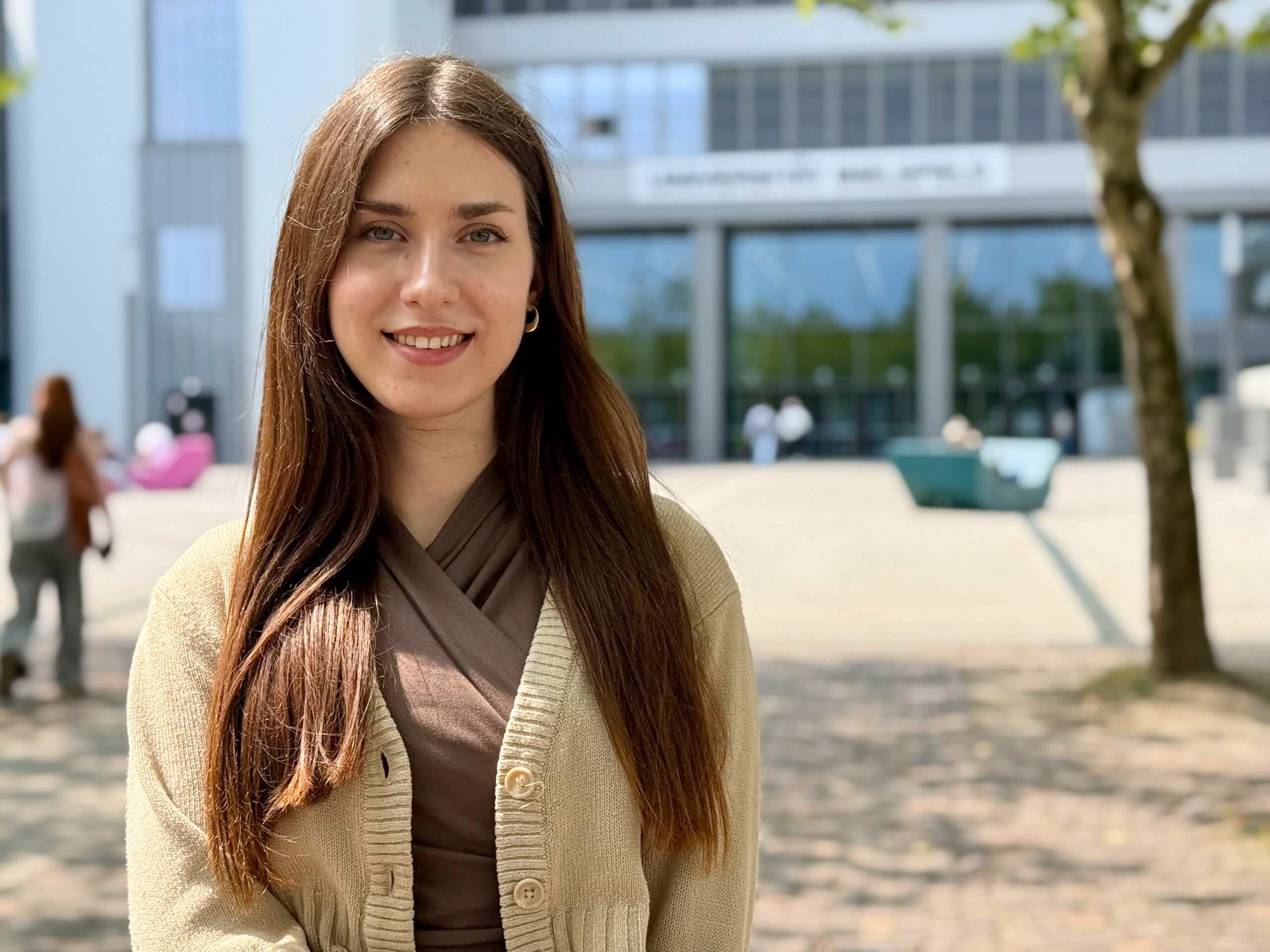
© Jana Haver
Mehria Niazi has been living in Germany for two years and has been studying for a Master’s degree in political science since this semester. She fled from Afghanistan. “I never wanted to leave my home country voluntarily,” she says. “Afghanistan needs young people and I would have liked to stay there, but unfortunately I was forced to leave.” When she came to Germany, she had no knowledge of German and had to start from scratch. “My mother tongue is Dari-Persian. At school, I learnt English and Arabic”, she says.
“I found it very difficult to learn German at first because, unlike my mother tongue, German is a gender-related and gender-based language.” However, the now 24-year-old found a way to understand the new language with its various articles and endings. She completed a bachelor’s degree in political science in her home country. She is now completing her Master’s degree in Bielefeld.
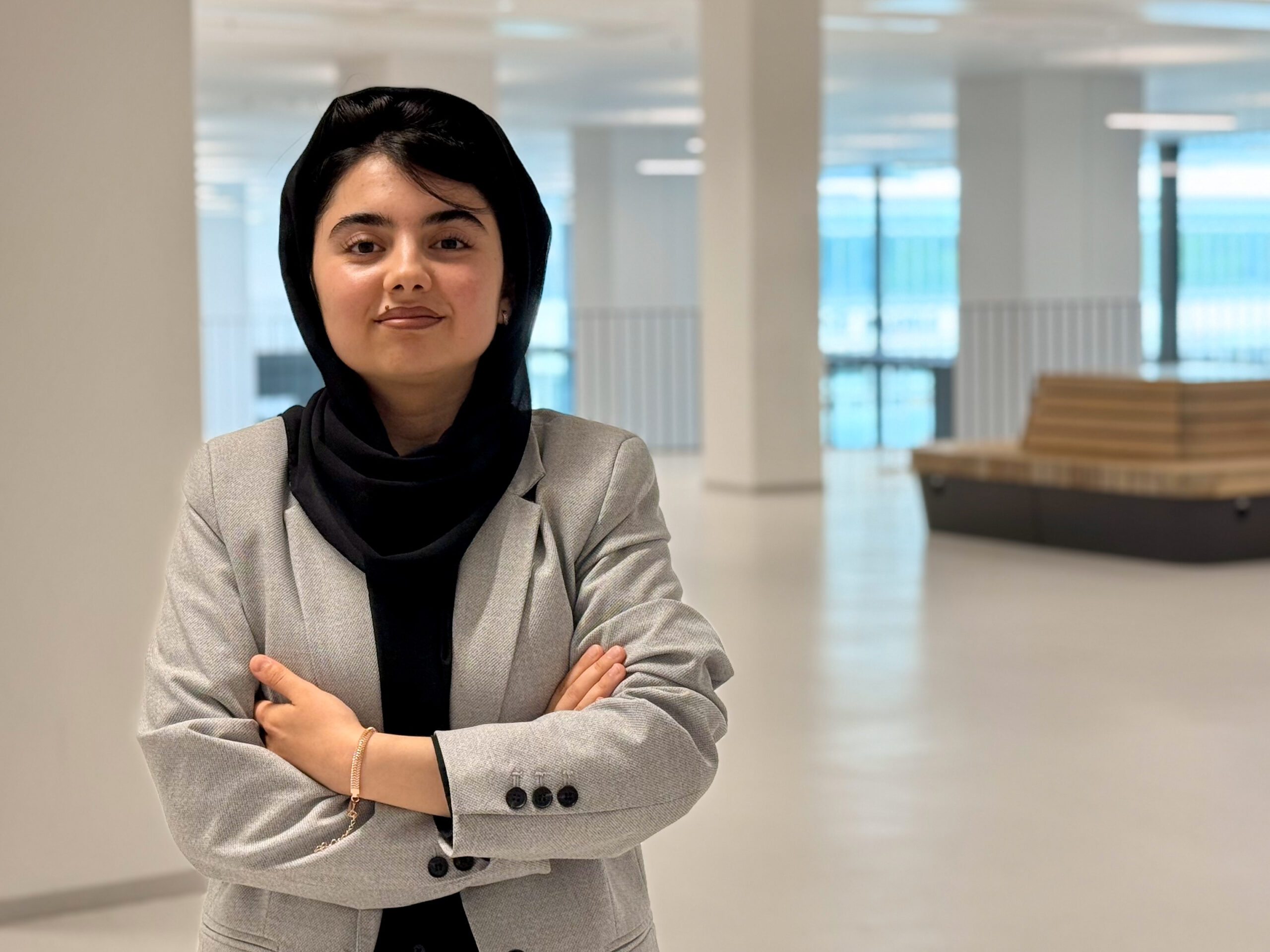
© Jana Haver
German is a difficult language
The two students found out about Bielefeld University’s preparatory German courses online. “I only applied two days before the application deadline,” recalls Oleksandra Rudyk. At first, she was afraid she wouldn’t be accepted. “You just have to have the courage,” she says. Today, she wants to encourage others to take this step too. Mehria Niazi also came across the German courses by chance. She already completed a German course at B2 level at Bielefeld University last summer semester and then, like Oleksandra Rudyk, started the preparatory German course at C1 level in the winter semester 2024/25.
The course takes place daily during the semester. “It was a full-time job at the time,” says Oleksandra Rudyk. “It’s not enough just to attend classes. You have to do various tasks, learn vocabulary and practise a lot at home.”
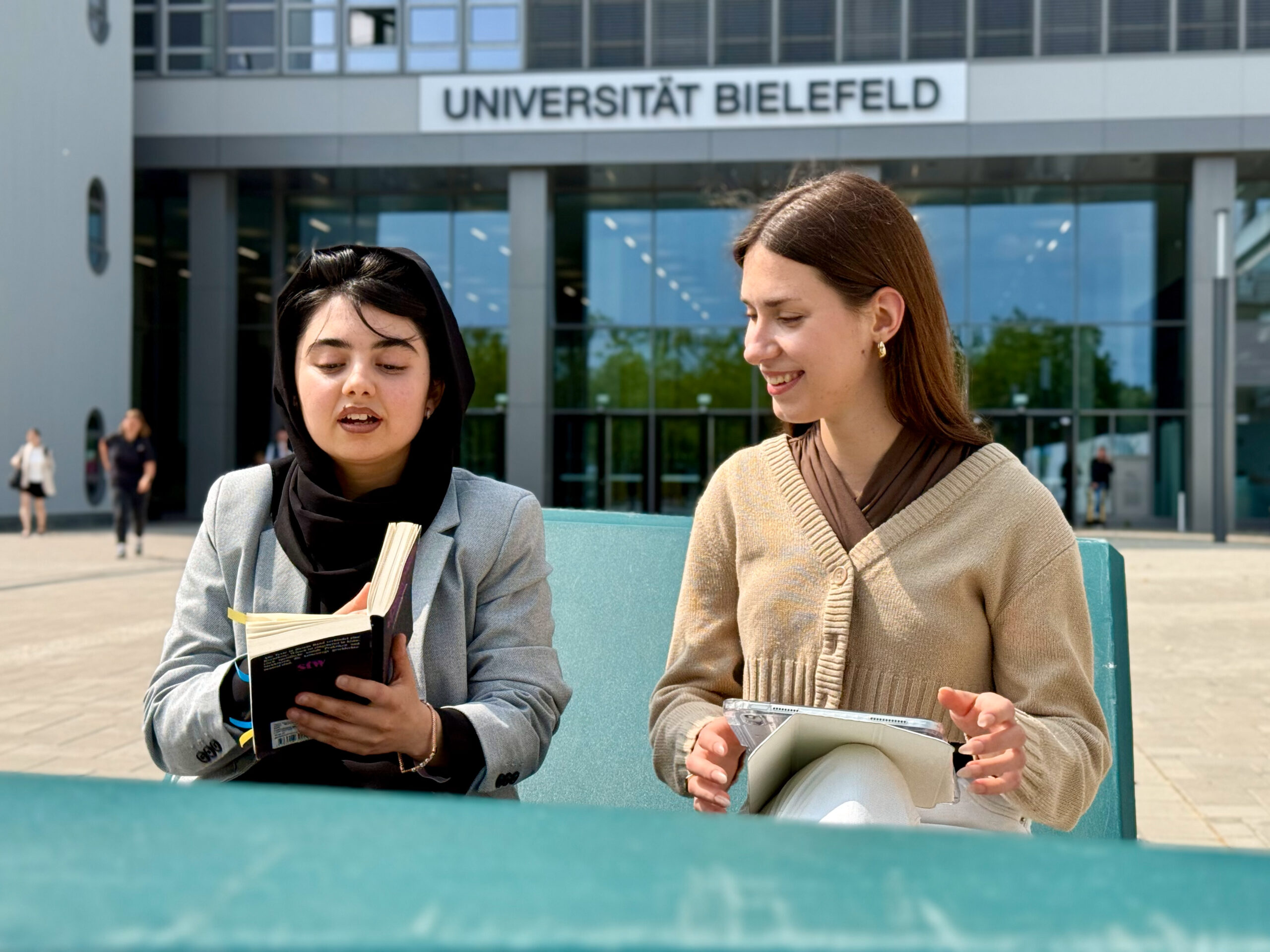
© Jana Haver
“German is a very difficult language,” says Mehria Niazi. “German grammar was very difficult for me at the beginning.” She worked hard and learnt a lot. In her free time, she also listened to many podcasts in German, read academic texts and practised a lot of language skills, also supported by ChatGPT.
Bridge to studying in Germany
“I saw the course as an opportunity for me,” says Mehria Niazi. “The course builds a bridge to my studies, but also to German culture.” Oleksandra Rudyk adds: “It was a good start to student life and very helpful to get to know the university – a bit like a demo version of studying.” The German course prepares the participants for studying in German later on. “We read and wrote a lot of academic texts, gave presentations and argued,” Mehria Niazi recalls.
Mehria Niazi and Oleksandra Rudyk enjoyed the strong group cohesion during the German course: “We were an international group from different cultures, but with the same goal,” says Mehria Niazi. Oleksandra Rudyk adds: “It was great to work in the group because everyone was there voluntarily, which meant that the motivation to achieve the goals was very high.” In addition to learning, there were joint relaxation and yoga sessions. The group also went to the Christmas market together.
The International Office tries to make it easier for students to start their studies by offering advisory events and other services as part of the orientation programme. They integrate these offers during the study preparation phase in order to break down barriers and inhibitions for students with a refugee background.
Everyone was excited before the final exam. “The TestDaF exam was digital and took about five hours,” recalls Oleksandra Rudyk. The university organises the official TestDaF exam of the Test DaF Institute. There were speaking, writing, listening and reading tasks. “I was very excited after the exam to see if I had passed because I really wanted to study,” says Oleksandra Rudyk. She passed the test after one semester with top marks.
Financing the degree programme
Oleksandra Rudyk came across the NRWege scholarship programme during an information event on financing her studies at the end of the course. “I applied straight away and was accepted after some waiting time,” she says. She has been supported since the start of her studies. The scholarship is another component of the NRWege ins Studium programme and helps students with a refugee background to finance their studies if they have no other funding options. Mehria Niazi finances her studies with BAföG. Both students are very ambitious and confident that they will successfully complete their studies at Bielefeld University. Without the preparatory German courses, their course start would probably not have been possible.
